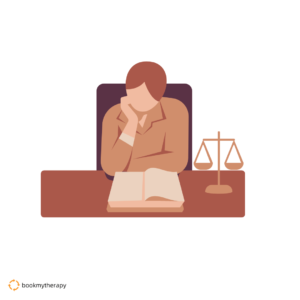Guarding Against Mental Health Discrimination: Legal Protections in Ontario
Rachel Deshpande

With mental health accessibility has become a more visible priority, there is an enlightened focus on mental health discrimination. Many people who do not experience mental health disabilities or addiction may not be able to recognize these forms of discrimination. Still, for those who do, knowing your rights and what protections you are entitled to is essential. The Canadian Human Rights Act ensures equal opportunities and access for all Canadians receiving services provided and authorized by the Federal government. This act outlines anti-discrimination laws for Canadians regarding housing, employment, employer standards, the military, lack of accommodations, employee organizations, wages, and other sectors [1]. This act sets the stage for the various provincial human rights legislation, including regulations to ensure anti-discrimination for those with mental health disabilities and addiction disorders.
The Ontario Human Rights Code
The Ontario Human Rights Code is the legislation particular to the province of Ontario, aimed at guaranteeing equal rights, freedom from discrimination, and preserving respect and dignity for all residents of Ontario[2]. It is not unlike the Canadian Charter of Rights and Freedoms, which protects our rights and freedoms across Canada as part of the Constitution. The Ontario Human Rights Code provides specific legislation to legal protections for Ontarian’s mental health rights. The Ontario Human Rights Code applies to various sectors of life, including employment, contracts, facilities and services, housing, unions, and more, to ensure that people with mental health disabilities do not face discrimination and can have the same opportunities as all other Ontarians.
Housing
People with mental health disabilities and addiction are entitled to housing rights as mentioned under the Ontario Human Rights Code. Housing providers must ensure that everyone has equal opportunities and access to housing while upholding full dignity and participation. Housing providers must provide accommodations as quickly as possible, cannot pry into their tenant’s lives, respect each individual and cover the cost of accommodations to ensure equal access for all tenants. Housing providers must try to provide accommodation, and if the tenant does not know they need accommodations, help ensure they experience the full range of benefits that every Ontarian is privileged to have. Confidentiality is also a housing right that all individuals are entitled to, along with adjusted criteria, assistance with applications, structural changes, deadline changes, communication adjustments and other accommodations [3].
Employment
Like housing, various employment laws are also subject to accommodation under the Canada Human Rights Act and the Ontario Human Rights Code. Ontario employment law states that employment organizations are expected to remove barriers that prevent those with disabilities from working and getting the most out of their job experience without being told. These barriers can include communication, systemic, attitude, and physical barriers. By representing the principles of inclusive design, workplaces can strive to create the most accessible workplace for employees of all different backgrounds without putting employees in the position of consistently asking for accommodations. Suppose your workplace or an organization fails to accommodate a mental health disability or is threatening their employees for advocating for their rights under the Ontario Human Rights Code. In that case, these all include grounds for legal action known as reprisal. Like housing, employers must only ask what is necessary, implement accommodations as soon as possible, cover the cost, and actively look to reduce barriers. Supporting individuals with mental health disabilities involves providing specific accommodations tailored to their needs, for example, job coaching, modified job requirements/expectations, modified breaks and schedules, alternative workspaces, etc. [4].
Discrimination
There are various forms of discrimination one can face due to a mental health disability that is usually based on prejudice and stereotypes. A few examples include facing discrimination by being unable to purchase a house due to a mental health disability, having issues with childcare and custody due to a mental health disability, or being fired from a job due to a mental health disability. People who have had a past mental health disability or people who are associated with others who have a mental health disability (including partners, family, friends, etc.) are all protected under the Ontario Human Rights Code. Multiple types of discrimination violate the Code and are included under the rights of those with mental health disabilities, including profiling, harassment, systemic and institutional discrimination, and a poisoned environment. [2].
Advocacy
Mental health advocacy and fighting for your rights are essential to ensuring these policies are being upheld. Injustices will continue to occur without advocating for yourself and the people around you.
To address violations of your human rights, the Ontario Human Rights Code provides a complete strategy that consists of:
- A barrier prevention, review and removal plan
- Anti-harassment and anti-discrimination policies
- An education and training program
- An internal complaints procedure
- An accommodation policy and practice [3]
If you believe your human rights are being violated, you can use these contacts to make a complaint to the Human Rights Tribunal of Ontario: Toll-Free: 1-866-598-0322; TTY Toll-Free: 1-866-607-1240; Website: www.hrto.ca or receive legal advice from the Human Rights Legal Support Centre: Toll-Free: 1-866-625-5179; TTY Toll-Free: 1-866-612-8627; Website: www.hrlsc.on.ca [5].
References:
[1] https://tinyurl.com/8n49tb9v
[2] Forms of discrimination based on mental health or addiction disabilities (fact sheet). Ontario Human Rights Commission. 2014). https://tinyurl.com/3z2ew4pr
[3] Discrimination based on mental health or addiction disabilities – Information for housing providers (fact sheet). Ontario Human Rights Commission. (2014). https://tinyurl.com/4m7jsfkp
[4] Preventing discrimination based on mental health and addiction disabilities : An overview for employers (brochure). Ontario Human Rights Commission. (2014). https://tinyurl.com/2p83zkn4
[5] Purpose of OHRC policies. Ontario Human Rights Commission. (2014). https://tinyurl.com/mr34a7dr
- Login
- Sign Up